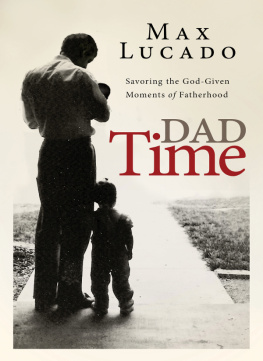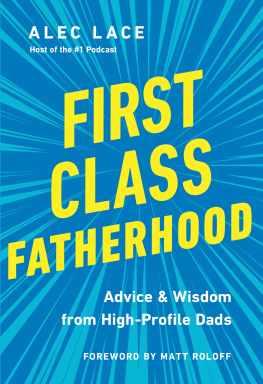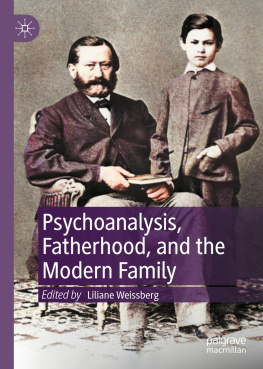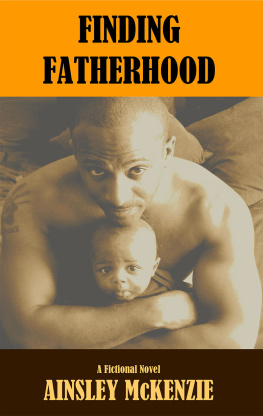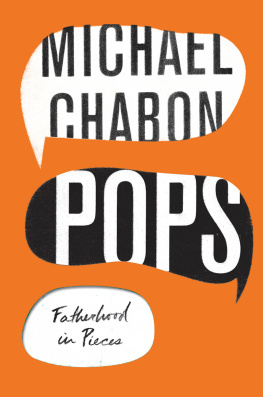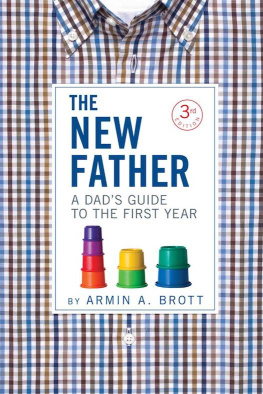Fatherhood
Fatherhood
Evolution and Human Paternal Behavior
Peter B. Gray
Kermyt G. Anderson
Harvard University Press
Cambridge, Massachusetts, and London, England
Copyright 2010 by the President and Fellows of Harvard College All rights reserved
Printed in the United States of America
First Harvard University Press paperback edition, 2012
Library of Congress Cataloging-in-Publication Data
Gray, Peter B., 1972
Fatherhood : evolution and human paternal behavior / Peter B. Gray, Kermyt G. Anderson.
p. cm.
Includes bibliographical references and index.
ISBN 978-0-674-04869-0 (cloth: alk. paper)
ISBN 978-0-674-06418-8 (pbk).
1. Human evolution. 2. Fossil hominids. 3. Fatherhood. 4. Paternity.
I. Anderson, Kermyt G. II. Title.
GN281.G7 2010
306.8742dc22 2009044271
For Megan, Sophie, and Stella
P.G.
For Ann, Keaton, and Mariel
K.A.
Contents
When I was a boy of fourteen, my father was so ignorant I could hardly stand to have the old man around. But when I got to be twenty-one, I was astonished at how much he had learned in seven years.
MARK TWAIN, OLD TIMES ON THE MISSISSIPPI
We (Peter Gray and Kermyt Anderson) dont share this view about our own fathers, but Mark Twains take on fatherhood reveals deep truths. Most importantly, many of us may not think about fatherhood at great length until we become fathers ourselves. The feelings of a growing pregnancy, the arrival of a helpless child, the impact on sleep, the readjustments in a marital relationshipall these things are real to a father in ways they might not be to a son. A younger man might seem ignorant compared to a practiced father.
We have gained fathering experience in two ways. The first is as scholars of fatherhood. We both began studying fathers years before we began writing this book together. Since the late 1990s, we have studied both male behavior and paternal behavior in particular, Peter working in Boston, Kenya, and Jamaica, Kermyt in Albuquerque and South Africa. While numerous practical considerations and theoretical interests drew us into this area of research, neither of us started graduate school with the goal of I want to write a book on fatherhood! That came much later, an unexpected consequence of our own interests in fatherhood as a research subject.
A second way in which we have become more knowledgeable about fatherhood is as fathers ourselves. Being fathers of young children colors our outlook on the scientific study of fatherhood and of course immerses us in its day-to-day reality. For Kermyt this fatherhood book and his own fathering behavior are closely tied together. Kermyts second child was gestating throughout the months when Kermyt was working most feverishly on his contribution to the book. In fact, the book and the baby seemed to be in direct competition at one point to see which would be finished first. For a while, Kermyt was telling friends that he was involved in two major projects, both due in December, neither yet named. The book won the race by only a matter of days. Kermyts daughter arrived soon thereafterstill in a rush, as she decided to skip the traditional slow labor and instead came out so fast that she was born alongside a highway en route to the hospital.
Peters two daughters (and Kermyts son) had arrived in a less dramatic fashion. But their arrival must have had an effect on our perception of the fathers we had already been studying, although in ways difficult to pinpoint. This raises the question, do you have to be a father to write about one? The answer, quite clearly, is no. Does it help? Thats more difficult to answer. At some level, our personal experiences with fatherhood surely led us to write a somewhat different book than if neither of us had been dads. You may judge whether the fingerprints of our own fatherhood are visible in the finished product.
Why do we need this book? A tremendous amount of information is available on human parenting. There are books and more books, journal articles, and more journal articles, all covering various facets of human parenting. Yet the vast amount of the scholarship on human parenting focuses on maternal behavior. Browse the nearest library, bookstore, or Web site, and you will find this to be the case. So there is far more ink spilled on motherhood than fatherhood, offering one reason why we might need a book on fatherhood.
This does not mean there is not a valuable, existing body of research on human fatherhood. There certainly is. However, much of the published work on fatherhood, especially that intended for popular audiences, seems to assume that men will read it only if it is interspersed with jokes, sports, and sex. Maybe book publishers feel that more humor than research content is needed to appeal to mens minds. This does not mean that such books are not enjoyable; we find humor and truth in books such as Wilders (2006) Daddy Needs a Drink, but this kind of popular work does not suit our present aims.
A different type of work, both scholarly and popular, takes another approach. These books and articles on human fatherhood discuss excellent empirical research but commonly conclude with advice or advocacyprescriptions for individual parenting style or for political facets of human fatherhood. Armin Brotts well-received books on fatherhood, such as his (2001) The Expectant Father, represent this kind of approach. Unlike such works, this book will not offer advice to individuals or to policy makers; rather, we prefer to synthesize research on human fatherhood in a way that we hope you will enjoy and that will give you pause for reflection.
There is a body of scholarly research on human fatherhood undertaken from evolutionary and cross-cultural approaches. This research tells us that in only 5% of species of mammals do males provide parental care. In addition, in all human societies, men spend less time in direct childcare than women. In human hunter-gatherer societies, men tend to spend more time with young children than in most other societies, especially ones in which men make a living herding livestock. A variety of studies have found that men tend to invest more in children if they are the biological parent rather than stepparent. A handful of recently published studies observe that fathers tend to have lower testosterone levels than do single men in the same society. Such findings tend to be scattered across journal articles and edited volumes. Read Barry Hewletts (1992) edited book entitled Father-child Relations or various books edited by fatherhood research guru Michael Lamb, such as his (2004) Role of the Father in Child Development, and you will find such data. These books, while excellent, are often highly technical, aimed at an academic audience, and are not easily accessible to a more general readership.
Our goal is to pull together the relevant scholarship on the evolution of human fatherhood into an accessible, readable book. Doing so will articulate the relevance of evolution to human paternal care. We also seek to synthesize this research in a way that will appeal to both academic and popular audiences. We want you to find value in this material, whether you are a father pondering your position, a policy maker trying to decipher why some men pay child support and others do not, or a global citizen questioning why paternal roles around the world seem both similar and different. At the very least, we hope that our synthesis challenges stereotypes of fathers, extends the scope of information on human fatherhood, and makes your fatherly musings more thoughtful.



